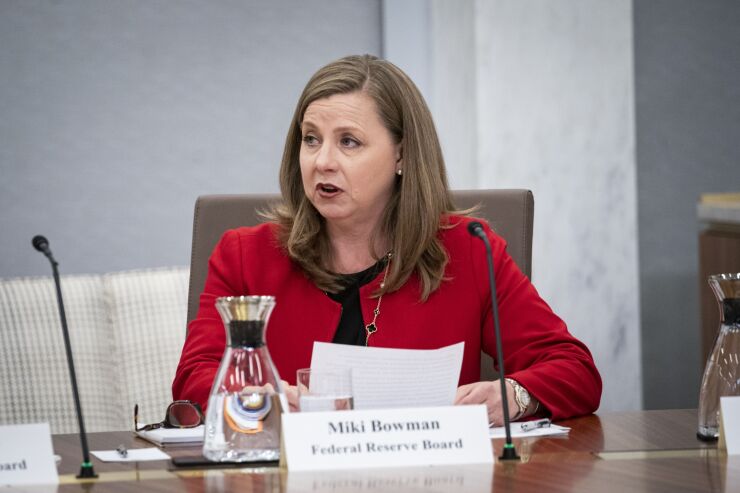
A Federal Reserve official took her fellow regulatory policymakers to task Tuesday for
Gov. Michelle Bowman, speaking at an event hosted by the Kentucky Bankers Association, said other regulators do not
"We need more people who understand banking and have done banking involved in the policymaking process," Bowman said. "Until you have that expertise in that rulemaking role, it's difficult to understand the burden we're putting on people."
The lack of real-world experience is particularly apparent in the
"They don't understand what those implications are, both intended and unintended," she said.
Bowman's comments come on the heels of the Federal Deposit Insurance Corp. and the Office of the Comptroller of the Currency
While the Fed has not formally changed its approach to mergers and acquisitions, Bowman said it has amended its application form to require more estimates about the project impacts of a proposed combination. The agency has delayed approvals on recent applications, making mergers more costly and more challenging, she said.
Referring to her own experience working for her family's bank — Farmers & Drovers Bank in Council Groves, Kansas — Bowman said this more stringent approach to bank combinations is especially challenging for resource-constrained community banks that often rely on M&A for growth or succession planning.
"It's important to understand that often the best outcome for a community or a financial institution is to merge or be acquired," she said. "You can have a better geographic reach for customers, there are succession planning considerations … there are a number of challenges, but there are a number of great benefits from mergers, acquisitions and the creation of new banks."
Fintech partnerships
A lack of banking experience has also colored how regulators approach third-party partnerships, including those with financial technology groups, Bowman said.
Banks should not be penalized when their fintech partners fail to uphold their agreements on certain compliance issues, she said. Often banks do not know they are engaging with entities that have deficiency or that have been placed on supervisory watchlists until after they enter contracts with the groups, said Bowman, noting that agencies are precluded from warning banks about these groups beforehand because of sensitivities regarding confidential supervisory information.
"We don't have guardrails for banks to work with validated, confirmed partners that supervisors think are legit," Bowman said, adding that she would like to see the Fed resurrect its office hours program, through which banks, fintechs and reserve bank supervisors could connect with one another. That program fell by the wayside during the COVID-19 pandemic.
Liquidity
Another area of concern Bowman raised was liquidity reform.
Bank regulators have not introduced new rules on this subject — opting instead for updating guidance on liquidity management and discount window usage — but she has concerns about some of the reforms being discussed. These include policies that would see banks shift away from using the Federal Home Loan banks as a funding source or turn to the Fed's discount window more readily.
Some of these proposals would remove choices from individual banks and bankers, Bowman said
"Recognizing the importance of how you choose services is something that is lost on people who've never been in business," she said.
Litigation
Bowman also weighed in on the impact of the Loper Bright Enterprises v. Raimondo decision from June, in which the Supreme Court overturned the long-running legal precedent known as Chevron deference. The principle had given agencies broad discretion over how to interpret unclear legal statutes. Without it, that discretion will now shift to the courts.
The decision is changing the calculus agencies make in rulemakings in a positive way, Bowman said
"The risk of litigation is already chilling the way agencies are thinking about new regulation," she said. "In my mind, that's an excellent influence on our regulatory process and will help moving forward."






